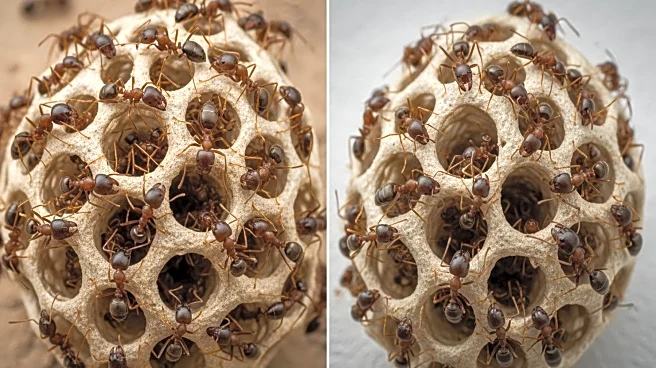What's Happening?
Researchers have discovered a unique reproductive strategy in Iberian harvester ants, where queens can produce eggs that develop into two different ant species. This phenomenon was uncovered while investigating the mystery of a missing ant species. The Iberian harvester ants, or Messor ibericus, were found to create hybrid worker ants by reproducing with another species, Messor structor, despite geographical separation. The study, published in Nature, reveals that the queens' eggs develop differently based on the need for future queens or a hybrid workforce. This discovery challenges existing understanding of ant reproduction, showing that ants can produce individuals of another species as part of their life cycle.
Why It's Important?
This finding has significant implications for the study of evolutionary biology and genetics. It demonstrates a novel reproductive strategy that could influence how scientists understand species adaptation and survival. The ability of Iberian harvester ants to clone another species' sperm to produce a hybrid workforce suggests a complex evolutionary adaptation that could provide insights into genetic manipulation and species survival strategies. This could impact ecological studies and conservation efforts, as understanding such mechanisms may help in preserving biodiversity and managing invasive species.
What's Next?
Future research will likely focus on understanding the cellular mechanisms that allow Iberian harvester queens to clone Messor structor ants. This could provide broader insights into cloning and genetic manipulation, potentially influencing scientific approaches in other species. Researchers may also explore the ecological impact of this reproductive strategy on local ecosystems and its role in the ants' survival and expansion across the Mediterranean.
Beyond the Headlines
The discovery of xenoparity, or the need to propagate another species' genome, opens new avenues in evolutionary biology. It raises questions about genetic diversity and long-term species survival, as asexual reproduction often leads to reduced genetic variation. This could have implications for the long-term viability of species that rely on similar reproductive strategies.









